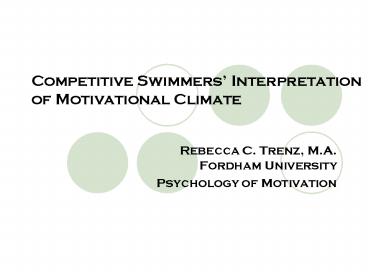Competitive Swimmers - PowerPoint PPT Presentation
Title:
Competitive Swimmers
Description:
Competitive Swimmers Interpretation of Motivational Climate Rebecca C. Trenz, M.A. Fordham University Psychology of Motivation Background Motivational Orientation ... – PowerPoint PPT presentation
Number of Views:98
Avg rating:3.0/5.0
Title: Competitive Swimmers
1
Competitive Swimmers Interpretation of
Motivational Climate
- Rebecca C. Trenz, M.A.Fordham University
- Psychology of Motivation
2
Background Motivational Orientation in the
Classroom
- Much of the research on developing appropriate
motivational goals in the classroom points to the
importance of creating a mastery orientated
climate that is salient to the student. - A motivational climate that places value on
effort, enhances perceived competence and
self-efficacy beliefs, fosters intrinsic
motivation, autonomy, and persistence is
recommended. - The type of motivational orientation a student
adopts is at least partially dependent on how the
student interprets the reality of the classroom
environment (Ames Archer, 1988). - Ames (1992) illustrates three categories that are
central elements in the design of the classroom
environment that promote a mastery orientation
tasks, evaluation and recognition, and authority.
3
Background Motivational Orientation in Sport
- Roberts and Treasure (1995) assert that adults
play an important role in creating the
motivational climate for their athletes. - When athletes adopt a mastery orientation in
sport, they are more satisfied, enjoy their
experience, and adopt adaptive achievement
strategies. - Autonomy, competence, and relatedness are
positively correlated with the perception of the
coachs mastery orientation across the season
(Reinboth Duda, 2004). - Characteristics of the mastery oriented coach are
praising an athletes personal progress, valuing
everyones role on the team, and an over-all
task-involved climate.
4
Research Questions
- Can swimmers accurately identify motivational
climate? - What characteristics of the motivational climate
do swimmers prefer?
5
Method
- Participants
- 150 competitive swimmers (75 male, 75 female)
mean age 15 - All participants are members of USA Swimming from
the Metropolitan area. - Procedure
- Swimmers will complete this experiment via an
internet website. - After consent is obtained swimmers will be given
a login ID to enter the website. - Demographic data will be collected (age, gender,
ability). - Swimmers will be randomly assigned to view one of
two coaching videos. - Mastery Coach or Performance Coach
- Swimmers will complete PMCSQ-2 and open-ended
questions. - A debriefing statement will follow the completion
of the questionnaires.
6
Materials
- Perceived Motivational Climate in Sport
Questionnaire-2 - PMCSQ-2 Newton, et al., 2000
- 33-item measure
- Stem On this team and is followed by a 5-point
scale ranging from 1 (strongly disagree) to 5
(strongly agree). - Mastery oriented scale includes 17 items
- e.g. On this team, trying hard is rewarded
- Performance oriented scale includes 16 items
- e.g. On this team, the coach gives most of his
or her attention to the stars
7
Materials
- Open-Ended Questionnaire
- What was the coach doing in the video?
- Why was the coach doing what she was doing in the
video? - What characteristics did you like about the coach
in the video? - What characteristics did you dislike about the
coach in the video? - Are there any characteristics of the coach that
you would change? - Are there any characteristics of the coach that
you thought were missing and you would like to
add? - How did you feel about the coaching style
depicted in the video? - Would you like to have this coach as your own?
- Why or why not?
8
Data Analysis
- PMCSQ-2
- Two mean scores are obtained
- Mastery oriented climate and performance oriented
climate - Open-Ended Questionnaire
- Responses will be coded into one of four
categories - Utility (e.g. what to do and how to do it)
- Mastery (e.g. understanding of task, task
enjoyment) - Performance (e.g. overt evaluations of
performance, or comparisons of performance) - Social (e.g. statements referring to
interpersonal relationships)
9
Results Summary
- Swimmers who watch the mastery oriented coach
will have significantly higher mean scores on the
mastery climate subscale of the PMCSQ-2 than
swimmers who watch the performance oriented
coach. - Swimmers who watch the performance oriented coach
will have significantly higher mean scores on the
performance climate subscale of the PMCSQ-2 than
swimmers who watch the mastery oriented coach. - Responses to the open-ended question will be
coded into four categories
Mastery
Performance
Social
Utility
10
Conclusions
- The motivational climate that the coach
establishes through cues and feedback affects the
motivational goals that the athlete will adopt. - To enhance a mastery oriented climate in the
competitive sport setting, coaches should
evaluate athletes based on personal improvement
and effort, as well as demonstrate and emphasize
the importance of interpersonal skills. - The development of a social component may speak
to the importance of the interpersonal
relationship between coach and swimmer. - The interpersonal relationship between a coach
and a swimmer may be an integral part of the
mastery oriented climate that is often overlooked
in sport and may ultimately translate into
psychological benefits for the swimmer.































